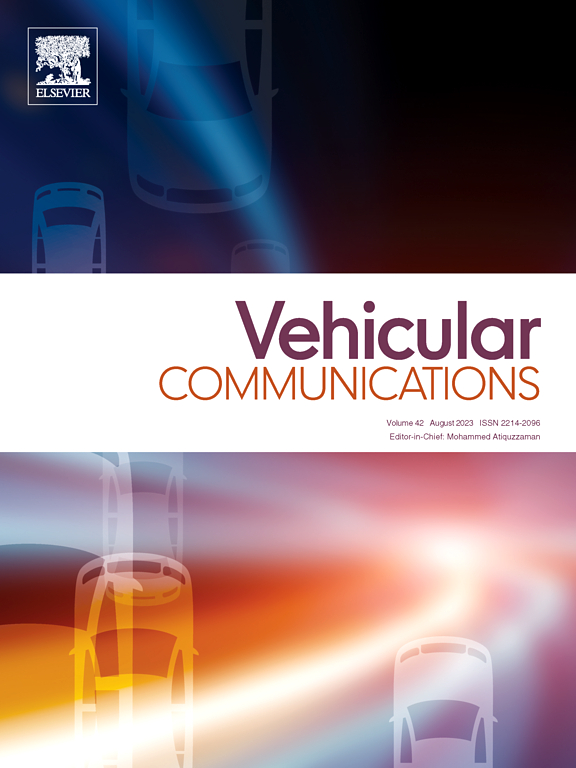RIS-aided jellyfish search optimization for multiuser wireless networks improvement
IF 6.5
2区 计算机科学
Q1 TELECOMMUNICATIONS
引用次数: 0
Abstract
Reconfigurable Intelligent Surfaces (RISs) provide a promising avenue for enhancing performance and implementation efficiency in multiuser wireless communication systems by enabling the manipulation of radio wave propagation. In this paper, an Augmented Jellyfish Search Optimization Algorithm (AJFSOA) is specifically designed to optimize the achievable rate in RIS-equipped systems. AJFSOA distinguishes itself from previous approaches through the integration of a novel quasi-reflection operator, which aids in escaping local optima, and an adaptive neighborhood search mechanism that improves the algorithm's exploitation capabilities. These enhancements enable AJFSOA to efficiently refine promising solutions near the current best solution. Unlike prior research, our work explores two objective models: maximizing the average achievable rate for all users to ensure balanced system performance and maximizing the minimum achievable rate for individual users to improve worst-case scenarios. The comprehensive analysis demonstrates that AJFSOA effectively increases system capacity and supports a larger number of users simultaneously. An extensive testing is performed on communication systems with twenty and fifty users, comparing AJFSOA's performance against existing algorithms, including the standard JFSOA, Particle Swarm Optimization (PSO), Ant Colony Optimization (ACO), Genetic Algorithm (GA) and Differential Evolution (DE). Results show that AJFSOA outperforms the other algorithms significantly, with improvements of 26.59%, 9.75%, 14.71%, 0.29% and 13.52% over JFSOA, PSO, ACO, GA and DE, respectively, for the first objective model, and 21.66%, 10.6%, .17.44%, 2.71% and 22.36% for the second model. These findings highlight the distinct advantages and superior performance of the presented AJFSOA in efficient optimizing multiuser wireless networks.
多用户无线网络改进的 RIS 辅助水母搜索优化
可重构智能表面(RIS)通过操纵无线电波的传播,为提高多用户无线通信系统的性能和实施效率提供了一条大有可为的途径。本文专门设计了一种增强水母搜索优化算法(AJFSOA),用于优化配备 RIS 的系统中的可实现速率。AJFSOA 有别于以往的方法,它集成了一个新颖的准反射算子(有助于摆脱局部最优状态)和一个自适应邻域搜索机制(提高了算法的利用能力)。这些改进使 AJFSOA 能够在当前最佳解决方案附近高效地完善有前景的解决方案。与之前的研究不同,我们的工作探索了两个目标模型:最大化所有用户的平均可实现速率以确保系统性能平衡,以及最大化单个用户的最小可实现速率以改善最坏情况。综合分析表明,AJFSOA 能有效提高系统容量,同时支持更多用户。在有 20 个和 50 个用户的通信系统上进行了广泛测试,比较了 AJFSOA 与现有算法的性能,包括标准 JFSOA、粒子群优化 (PSO)、蚁群优化 (ACO)、遗传算法 (GA) 和差分进化 (DE)。结果表明,AJFSOA 的性能明显优于其他算法,在第一个目标模型中,AJFSOA 比 JFSOA、PSO、ACO、GA 和 DE 分别提高了 26.59%、9.75%、14.71%、0.29% 和 13.52%;在第二个目标模型中,AJFSOA 比 JFSOA、PSO、ACO、GA 和 DE 分别提高了 21.66%、10.6%、.17.44%、2.71% 和 22.36%。这些发现凸显了所提出的 AJFSOA 在高效优化多用户无线网络方面的独特优势和卓越性能。
本文章由计算机程序翻译,如有差异,请以英文原文为准。
求助全文
约1分钟内获得全文
求助全文
来源期刊

Vehicular Communications
Engineering-Electrical and Electronic Engineering
CiteScore
12.70
自引率
10.40%
发文量
88
审稿时长
62 days
期刊介绍:
Vehicular communications is a growing area of communications between vehicles and including roadside communication infrastructure. Advances in wireless communications are making possible sharing of information through real time communications between vehicles and infrastructure. This has led to applications to increase safety of vehicles and communication between passengers and the Internet. Standardization efforts on vehicular communication are also underway to make vehicular transportation safer, greener and easier.
The aim of the journal is to publish high quality peer–reviewed papers in the area of vehicular communications. The scope encompasses all types of communications involving vehicles, including vehicle–to–vehicle and vehicle–to–infrastructure. The scope includes (but not limited to) the following topics related to vehicular communications:
Vehicle to vehicle and vehicle to infrastructure communications
Channel modelling, modulating and coding
Congestion Control and scalability issues
Protocol design, testing and verification
Routing in vehicular networks
Security issues and countermeasures
Deployment and field testing
Reducing energy consumption and enhancing safety of vehicles
Wireless in–car networks
Data collection and dissemination methods
Mobility and handover issues
Safety and driver assistance applications
UAV
Underwater communications
Autonomous cooperative driving
Social networks
Internet of vehicles
Standardization of protocols.
 求助内容:
求助内容: 应助结果提醒方式:
应助结果提醒方式:


